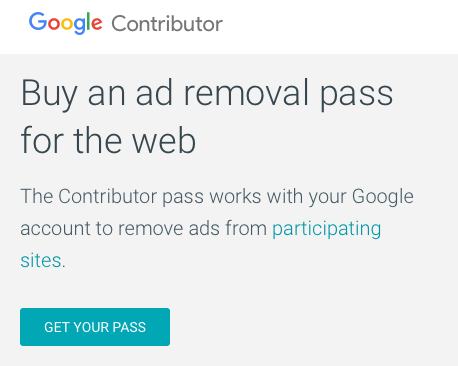Google unveiled its strategy of a grand ad reform
A new tool has become available in Google Webmaster — Ad Experience Report. In it, the site owner is to find screenshots and videos of ads on the site, which Google finds unacceptable and annoying by the standards of Better Ads. And since 2018 no ads will be shown in Chrome browser on the sites that do not comply with the Better Ads Standards (even ads owned or served by Google).
Besides, Google launched a beta of the tool Funding Choices. It helps a webmaster to address users who block ads and ask them to either disable ad blocking or pay for ad-free access. Users can pay through Google Contributor, which acts here as a kind of adblocker, paid for users, voluntary for sites, compensating them profit losses from ad blocking and bringing profit to Google itself. It works like this: a user tops up his account, each time he visits a website that uses the Contributor, a per-page fee is deducted from his account to pay the creators of the website, a part of the money is kept by Google. The user sees no ads on the pages.

Funding Choices already work in US, Canada, UK, Germany, Australia and New Zeland, for other regions it launches this year.
Funding Choices are accompanied by tips from Google on talking to blocking users in order to persuade the site to be whitelisted. In particular:
- keep it short and to the point;
- speak to your audience in your own voice;
- give visitors multiple opportunities to see your message;
- be open and honest, not accusatory, explain how ads support the site;
- avoid jargon. Instead of whitelisting, say "allow ads";
- remind regular visitors of how often they come to your site (for example, "you've consumed 10 articles today");
- treat your visitors with respect.
All these actions draw a general strategy of controlling advertising on the web, which becomes possible for Google due to the popularity of its browser, search and advertising services, as well as to partnering with other major advertisers and publishers. The outline of this strategy had become clear from the activity of the Better Ads coalition, and we have already written about it.
We support all initiatives that improve the quality of ads, reduce their quantity and give alternative methods of monetization to site owners. But we are concerned about the market regulation by one of its participants. Google is a huge business built on online advertising, and its regulation techniques would probably serve the protection of its own interests.
In addition, whatever high-quality and standards-compliant, an ad is still an ad, and we understand the desire of many users not to see it at all. So, instead of hoping that Google masterfully balances the conflicting interests of users, marketers, websites, its competitors and its own, we build AdGuard, which simply blocks advertising, without claiming the role of its reformer or regulator. And if you want to support a particular site or trust the ads on it, you can add it to the AdGuard whitelist yourself.




















































